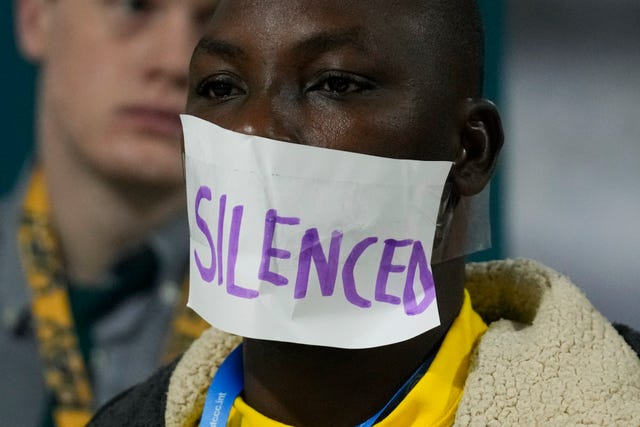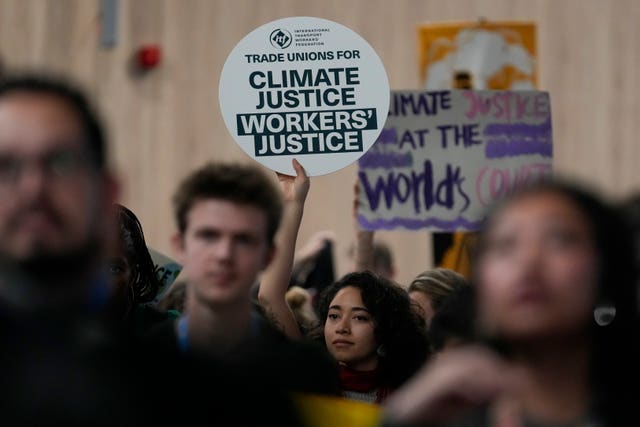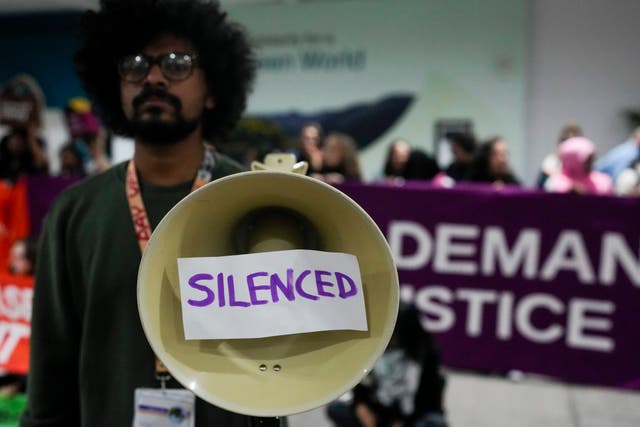
Hundreds of activists formed a human chain outside one of the main halls at the United Nations climate summit on what is traditionally their biggest protest day during the two-week talks.
The demonstration in Baku, Azerbaijan, was echoed at sites around the world in a global “day of action” for climate justice that has become an annual event.
Activists waved flags, snapped their fingers, and hummed and mumbled chants in a silent protest, with many covering their mouths with the word “Silenced”.
Demonstrators held up signs calling for more money to be pledged for climate finance, which involves cash for transitioning to clean energy and adapting to climate change.

It comes as negotiators at the venue try to hammer out a deal for exactly that but progress has been slow and observers say the direction of any agreement is still unclear.
Lidy Nacpil said protesters like her are “not surprised” about how negotiations are going. But past wins such as a loss and damage fund that gives developing nations cash after extreme weather events exacerbated by climate change keep organisers going, said Ms Nacpil, a co-ordinator with the Asian People’s Movement on Debt and Development.
“The role we play is to increase the pressure,” she said of the action. “We know we’re not going to get the results that the world needs in this round of negotiations, but at least to bring us many steps closer is our hope, is our aim.”
She added: “I think we have no option but to keep fighting … It’s the instinctive response that anyone, any living being, living creatures will have, which is to fight for life and fight for survival.”

Tasneem Essop said the action was challenging to organise.
“To be able to pull off something where people feel their own power, exercise their own power and get inspired in this creative way, I’m super excited about this,” she said.
Ms Essop says she is “not very” optimistic about an outcome on finance, but knows next week will be pivotal.
“We can’t end up with a bad deal for the peoples of the world, those who are already suffering the impacts of climate change, those who need to adapt to an increasing and escalating crisis,” she said. “We fight until the end.”
Activists in Baku were joined by protests big and small around the world.
Negotiators at Cop29, as the talks are known, are working on a deal that might be worth hundreds of billions of dollars to poorer nations. Many are in the Global South and already suffering the costly impacts of weather disasters fuelled by climate change.
Several experts have said one trillion dollars a year or more is needed both to compensate for such damages and to pay for a clean-energy transition that most countries cannot afford on their own.
Samir Bejanov, deputy lead negotiator of this year’s climate talks said in a press conference that the climate finance talks were moving too slowly.
“I want to repeat our strong encouragement to all parties to make as much progress as possible,” he said. “We need everyone to approach the task with urgency and determination.”
Diego Pacheco, a negotiator from Bolivia, said that the amount of money on the table for developing countries needs to be “loud and clear”.
“No more speeches but real money,” he said.

Observers were also disappointed at the pace of progress.
“This has been the worst first week of a Cop in my 15 years of attending this summit,” said Mohamed Adow, of climate think tank Power Shift Africa.
“There’s no clarity on the climate finance goal, the quality of the finance or how it’s going to be made accessible to vulnerable countries.”
“I sense a lot of frustration, especially among the developing country blocks here,” he said.
Panama environment minister Juan Carlos Navarro agreed, telling The Associated Press he is “not encouraged” by what he’s seeing at Cop29 so far.
“What I see is a lot of talk and very little action,” he said, noting that Panama is among the group of countries least responsible for warming emissions but most vulnerable to the damage caused by climate change-fuelled disasters.
“We must face these challenges with a true sense of urgency and sincerity,” he said. “We are dragging our feet as a planet.”


Why are you making commenting on The Herald only available to subscribers?
It should have been a safe space for informed debate, somewhere for readers to discuss issues around the biggest stories of the day, but all too often the below the line comments on most websites have become bogged down by off-topic discussions and abuse.
heraldscotland.com is tackling this problem by allowing only subscribers to comment.
We are doing this to improve the experience for our loyal readers and we believe it will reduce the ability of trolls and troublemakers, who occasionally find their way onto our site, to abuse our journalists and readers. We also hope it will help the comments section fulfil its promise as a part of Scotland's conversation with itself.
We are lucky at The Herald. We are read by an informed, educated readership who can add their knowledge and insights to our stories.
That is invaluable.
We are making the subscriber-only change to support our valued readers, who tell us they don't want the site cluttered up with irrelevant comments, untruths and abuse.
In the past, the journalist’s job was to collect and distribute information to the audience. Technology means that readers can shape a discussion. We look forward to hearing from you on heraldscotland.com
Comments & Moderation
Readers’ comments: You are personally liable for the content of any comments you upload to this website, so please act responsibly. We do not pre-moderate or monitor readers’ comments appearing on our websites, but we do post-moderate in response to complaints we receive or otherwise when a potential problem comes to our attention. You can make a complaint by using the ‘report this post’ link . We may then apply our discretion under the user terms to amend or delete comments.
Post moderation is undertaken full-time 9am-6pm on weekdays, and on a part-time basis outwith those hours.
Read the rules hereLast Updated:
Report this comment Cancel